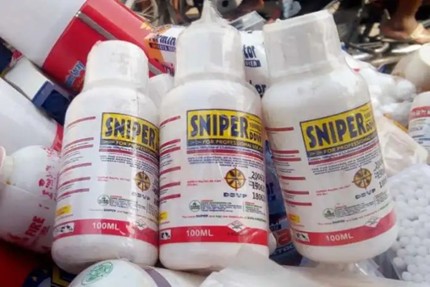
Both street vendors and hawkers are seen selling the dangerous pesticide/ chemical in town despite it being banned in The Gambia.
The Hazardous Chemicals and Pesticide Control Management in 2022 announced the ban on the importation and sale of the hazardous chemical and pesticide called sniper.
The decision affects its importation, stocking, distribution, sale and usage in The Gambia. The ban took effect in 2022 following a trending audio on messaging app-Whatsapp, where it was alleged that the hazardous chemical was being used in the processing of smoked fish.
The Point can reliably confirm that the dangerous chemical has resurrected in Gambian market but could not ascertain whether the smoked fish mongers are still using the hazardous chemical or not.
In his previous remark on Sniper, Dr Edriser Baldeh, Gambian food scientist, said research evidence has shown that sniper can be deadly when absorbed by the skin as when ingested or inhaled.
"Consequently, there are deaths of humans dying by intentional intake of the poison (suicide). On the other hand, there is also a report of workers who died after accidentally spilling Sniper on their skins and failing to wash it immediately,” he cited.
"Besides causing sudden death, Sniper is also reported to cause organophosphate-induced delayed neuropathy, low sperm count, loss of bladder control, muscle tremors, respiratory problems, autoimmune hepatitis, blurred vision, salivation, vomiting, diarrhoea, eye and skin irritation, runny nose, loss of appetite, dizziness among others."
He said further: "In addition, there have been many debates about the carcinogenicity of Sniper. Whilst some researchers reported that mice exposed to the poison developed some forms of cancer, there is no evidence that it can induce cancer in human."
Nonetheless, he noted that the International Agency for Research on Cancer and two American authoritative institutes, the Department of Health and Human Services and the Environmental Protection Agency have all concluded that dichlorvos may possibly be a human carcinogen (a substance that can cause cancer).
"Although Sniper is hazardous, the good side is it has a short life due to its rapid breakdown or metabolism. When it is exposed to new environments, it is broken down into two different forms of compounds (chemicals)," the doctor said.
"The silver lining is: these new compounds are less harmful than the original. Besides, it is also extremely volatile. Thus, when it is applied in a ventilated surface including water, most of it evaporates after a couple of hours."
Moreover, he said, when ingested, it is transported to all organs of the body through the bloodstream and metabolised. These metabolites later exit the body through air (breathing), urine, faeces, or milk in case of lactating animals.
"However, it can also be accumulated into the liver and kidneys. Thus, a sustained exposure to the pesticide can be injurious to health. On the bright side, pesticide residue including sniper can be drastically reduced in food by thorough washing and cooking," Dr Baldeh explained.
"Therefore, due to poor handling practices, our people that use the pesticide to preserve food may somewhat be at greater risks of ‘self-poisoning’ than the consumers. However, this depends on the conditions of both the chemical substance and food mentioned above."





